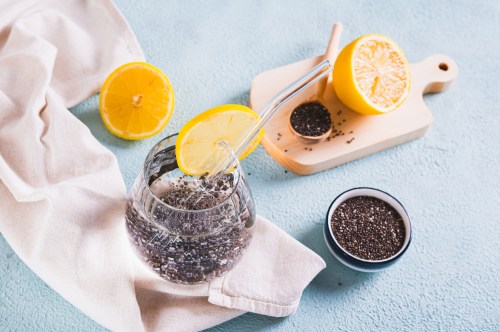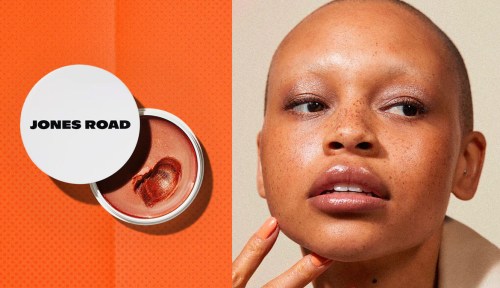Let’s be real. Staying up late binge-watching your favorite show has probably resulted in a case of puffy under-eyes. But a lack of sleep isn’t the only culprit. Your diet could be causing the annoying (and sometimes hard-to-get-rid-of) problem, too.
Experts in This Article
registered dietitian based in Toronto, Canada
While genetics and your anatomy play a role (thanks, mom and dad!), many of the foods you’re eating or drinking on a regular basis could be responsible for the puffiness. Before delving into the dos and don’ts, it’s important to first look at the full picture and address common questions about the root causes of the issue—and precisely how to combat it, once and for all.
What are the main causes of puffy eyes?
There are multiple reasons why you could be experiencing puffy under-eyes. “Some degree of under-eye puffiness is a natural part of aging, and everyone’s skin is unique,” says Anar Allidina, MPH, RD, a registered dietitian based in Toronto, Canada. You can even get puffy eyes from crying. However, if your puffiness is persistent, these are the main causes to be aware of.
Diet and lifestyle
Can caffeine cause puffy eyes? How about sugary foods and alcohol? Whether you’ve been loading up on salty snacks or sipping one too many lattes, many of the things we eat and drink every day can be responsible for under-eye swelling. (More on that later.)
Allergies and intolerances
Wondering what allergies cause puffy eyes? There’s a lot of them. According to Allidina, when your body reacts to an allergen—be it pollen, pet dander, dust mites, or even certain foods—it releases histamine. Histamine then triggers your body to respond in multiple ways.
“Histamines can cause various allergic symptoms, including inflammation and swelling,” she says. “In the case of puffy eyes from allergies, the immune system responds to the allergen as if it were harmful, triggering the release of histamines. These histamines can lead to inflammation and dilation of blood vessels, causing the tissues around the eyes to swell. This swelling can result in puffiness, redness, and itchiness.”
As for what food allergies cause puffy eyes, Allidina says everything from gluten to shellfish to nuts may trigger a response in sensitive individuals. If you’re looking for a food allergy swollen eyes treatment, antihistamine eye drops are typically the solution. But because everyone is different and some cases can be more serious than others, get in touch with a doctor to ensure you’re getting the proper care.
Lack of sleep
Whether it’s due to stress, anxiety, a late-afternoon coffee, or a case of revenge bedtime procrastination, missing out on sleep could cause you to wake up with puffy eyes. “Lack of quality sleep is a known factor in the development of puffy eyes,” says Allidina. “When you don’t get enough rest, the body may not have sufficient time to regulate fluid balance, leading to puffiness.”
Dehydration
Staying hydrated is easier said than done. When it comes to your skin—eye area, included—making sure you’re upping your intake is crucial in combating puffiness. “When the body is dehydrated, it tends to retain water as a protective mechanism,” she says. “This happens because the body perceives a shortage of water and retains water in certain tissues, including the skin around the eyes, which can lead to puffy eyes.”
6 foods that cause swollen eyes
Because what you’re eating can play such a big role in under-eye puffiness, knowing which foods and drinks to avoid can make a big difference—no expensive skin-care products needed. With that being said, it’s important to note that it’s not just about limiting certain foods.
“Maintaining a well-balanced diet rich in fruits, vegetables, whole grains, and lean proteins is equally important. Staying hydrated by drinking plenty of water is crucial, too,” says Allidina. “If you suspect that certain foods might be contributing to your under-eye puffiness, consider keeping a food diary and discussing your concerns with a registered dietitian for personalized advice.”
While everyone’s body reacts differently, here are the most common culprits behind puffiness.
1. Anything super salty
In terms of foods causing water retention, anything salty can be a problem. So if you’ve ever experienced puffiness or under-eye bags after a high-sodium meal, you’re not imagining things—salt-induced eye swelling is a thing. “Salt has the ability to attract and hold onto water. When you have high amounts of salt, it can lead to water retention or fluid buildup in various tissues, including the skin around the eyes. This increased fluid can lead to puffiness,” says Allidina.
2. Alcoholic beverages
There are a few different reasons why drinking alcohol can leave you with puffy eyes. “Alcohol consumption can contribute to under-eye puffiness through dehydration, blood vessel dilation, and disrupted sleep patterns,” says Allidina. Limit your alcohol intake to prevent the issue. And when you do drink, make sure you’re staying hydrated by drinking plenty of water alongside those margaritas.
3. Coffee, energy drinks, and anything loaded with caffeine
Wondering if caffeine can cause puffy eyes? If you’ve noticed swelling after overdoing it on coffee, tea, or energy drinks, Allidina says it could be due to the dehydrating nature of caffeine, which can lead to under-eye puffiness. If you think dehydrating foods and drinks could be causing water retention, simply reduce your intake.
“Caffeine is a diuretic, which means it promotes increased urine production and can lead to dehydration. While this dehydration effect isn’t as pronounced as with alcohol or certain medications, it can contribute to fluid imbalance in the body,” says Allidina. “While some people may be more sensitive to the diuretic effects of caffeine, others may not experience significant changes.”
4. High-sugar foods
You might already know that excess sugar intake can lead to acne. Unfortunately, that’s not the only way it can affect your skin. “Consuming too much sugar can lead to inflammation, affecting the delicate skin around your eyes,” says Allidina. If you’re experiencing puffy under-eyes and think sugar may be the culprit, she recommends better moderating your intake.
This Parisian Skincare Brand Is Launching in the United States for the First Time—Here’s What a Derm Wants You to Know

We’re Calling It: Cleansing Balms Are the Face Wash of the Future—Here Are 3 to Add to Your Cart

This Is the One Product That Scarlett Johansson Always Keeps in Her Purse and on Her Bedside Table

“Limit the consumption of foods and drinks high in added sugars, such as sugary snacks, desserts, and sweetened drinks,” she says. “Instead, do your best to choose whole foods. Focus on a balanced diet that includes fruits, vegetables, whole grains, and lean proteins.”
5. Dairy products
Food allergies cause puffy eyes, especially in the case of dairy. “Dairy intake may contribute to under-eye puffiness in people who have lactose intolerance, food sensitivities, or allergic reactions,” says Allidina. “Many people are lactose intolerant, meaning they lack the enzyme lactase needed to properly digest lactose, the sugar found in milk and dairy products. Undigested lactose can lead to digestive issues, such as bloating and gas. In some cases, these symptoms may contribute to facial puffiness, including under-eye puffiness.”
6. Fried and processed foods
Of all the foods that cause swollen eyes, French fries might be the saddest. Foods high in saturated fats—think anything fried and processed—can contribute to inflammation. This, in turn, can lead to puffiness. These foods also tend to be loaded with sodium, which can result in salt-induced eye swelling as well. “Opt for healthier cooking methods and choose whole, unprocessed foods when you can,” says Allidina.
5 foods that reduce puffy eyes
Wondering if there are specific foods that reduce puffy eyes? These fruits, veggies, and healthy protein sources will do the trick, from ultra-hydrating cucumbers to skin-boosting salmon.
1. Cucumbers
There’s a reason why cucumbers tend to be a fan favorite at spas. “Cucumbers are a hydrating superstar with high water content, helping in reducing puffiness,” says Allidina. “They also contain antioxidants and silica, which can help soothe and rejuvenate the skin around the eyes. Placing chilled cucumber slices on your eyes can help nourish the sensitive area.”
2. Chamomile tea
Chamomile tea has numerous benefits, and helping out your under-eye area is one of them. “Known for its anti-inflammatory properties, chamomile tea can help soothe and calm irritated skin,” says Allidina. Place cooled tea bags on eyes to alleviate puffiness and reduce inflammation. (This is a great hack for soothing tired eyes, too.)
No tea bags on hand? If you’re trying to figure out how to get rid of puffy eyes in the morning instantly, another option is to place a cold pack or cold washcloth over your eye area. “The cold temperature helps constrict blood vessels and reduce swelling pretty quickly,” says Allidina.
3. Berries
Berries—think blueberries, strawberries, and raspberries—are rich in antioxidants. Vitamin C in particular, which Allidina says supports collagen production. “This can contribute to skin elasticity, helping to minimize puffiness around the eyes,” she says. When you work these anti-inflammatory diet foods into your go-to meals, they don’t just help with reducing under-eye puffiness—they also promote vibrant and healthy skin overall.
4. Watermelon
If you want to counteract the effects of all the dehydrating foods you’ve been eating, watermelon is here to help. It’s packed with vitamins A and C, which Allidina says promote skin elasticity and hydration, potentially reducing eye puffiness.
5. Salmon
When delving into the basics of healthy skin nutrition, salmon always stands out as a favorite. The anti-inflammatory diet staple is a great pick for reducing eye puffiness. “Packed with omega-3 fatty acids, salmon supports skin health and may reduce inflammation,” says Allidina. “The anti-inflammatory properties of omega-3s can potentially help alleviate under-eye puffiness and dark circles.”
4 more ways to treat puffy eyes
You now know you can make a big difference by eating foods that reduce puffy eyes (and avoiding the foods that cause swollen eyes). You also know to keep your salt, sugar, caffeine, and alcohol intake to a minimum. But what else can you do to combat the issue? These additional tips and tricks will leave the area refreshed and revitalized.
1. Use a cold compress
If you’re hoping to get rid of puffy eyes in the morning instantly, there are a couple things Allidina recommends trying. First, place a cold compress—think a washcloth or ice pack wrapped in a thin cloth—to your eye area. This will help constrict the blood vessels in the area, reducing the swelling and soothing tired eyes. If you want to level-up, you can also use cold tools that depuff the area.
2. Drink water right when you wake up
Stay away from the coffee pot—at least until you’ve chugged some water. “Drinking a glass of water when you wake up has many benefits. Water will help flush out excess salt and reduce fluid retention,” she says. “If you’re a coffee person, make it a habit to hydrate before you caffeinate.”
3. Add protein to every meal
One of Allidina’s top healthy skin nutrition tips is getting enough protein, as it plays a crucial role in keeping your skin healthy—especially the delicate area around your eyes. “Try to have a source of protein every time you eat,” she says. “Consuming protein-rich foods supports collagen synthesis, helping to maintain skin firmness and reduce sagging, which can contribute to under-eye puffiness.” Opt for animal proteins (like lean meats, poultry, fish, and eggs), plant proteins (like tofu, legumes, nuts, and seeds), or all of the above.
4. Go to bed early—seriously
Yeah, yeah—sticking to an actual bedtime isn’t nearly as fun as staying up late with your good pal Netflix. Unfortunately, Allidina says a lack of sleep is a key contributor to puffy eyes, as it denies your body the necessary time to regulate fluid balance. To soothe tired eyes and ensure you’re waking up feeling refreshed, make an effort to go to bed early. Beauty sleep for the win.
Frequently asked questions
How does salt intake affect eye puffiness?
Salt attracts and holds onto water, so anytime you’re eating high amounts, you could experience fluid build-up in your eye area that will leave you looking puffy. If you’re hoping to limit salt-induced eye swelling, ensure foods that cause water retention are eaten in moderation. (Salty options like chips, processed snacks, and canned soups.)
How does alcohol consumption impact eye puffiness?
A drink here and there is fine. However, when you go overboard on dehydrating foods like alcohol, you may wind up with puffy under-eyes. “This makes your eyes appear more sunken and contributes to puffiness,” says Allidina. She recommends counteracting the dehydrating effects of alcohol by having a glass of water between drinks.
Can dairy products worsen puffy eyes?
Eating dairy isn’t going to cause issues for everyone. However, for those sensitive to dairy, it could contribute to inflammation and puffiness. “If you suspect dairy might be a culprit, consider reducing your intake,” says Allidina. The good news? There are so many dairy-free options available that can be part of any anti-inflammatory diet—ice cream, cheese, and beyond.
Sign Up for Our Daily Newsletter
Get all the latest in wellness, trends, food, fitness, beauty, and more delivered right to your inbox.
Got it, you've been added to our email list.








